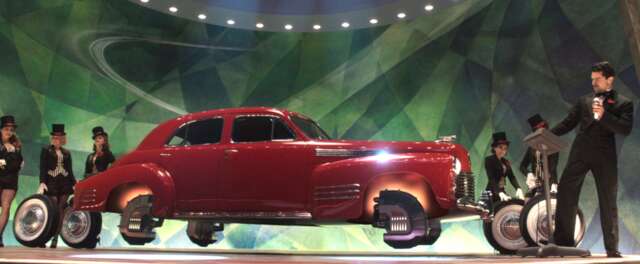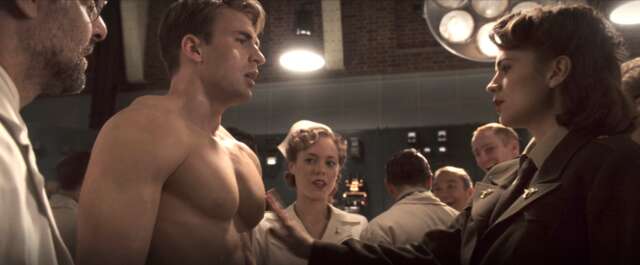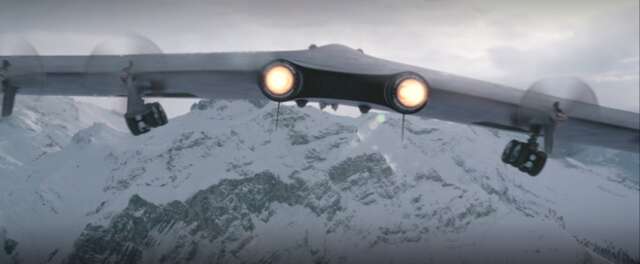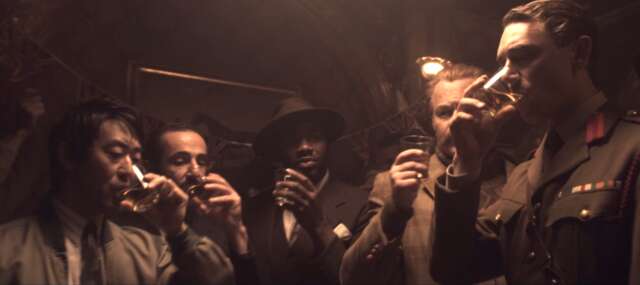|

Back in 2011, when Marvel Studios was laying down the foundational bricks for its cinematic universe, it took two major risks with its Captain America solo project. Both of them paid off. The first risk was the setting. Captain America: The First Avenger takes place almost entirely in World War II-era New York City. It is a period piece; we see modern-day events, but only in the opening and closing minutes of the film. The second risk was interdependence. At a time when success was uncertain, the filmmakers went with a (relatively) smaller approach, content to set conflicts up instead of resolving them. And years later, it's clear how important this movie was to the bigger story--how it gave our favorite characters depth and a contextual history that stretched 80 years into the past. Here are 31 Easter Eggs and references in Captain America: The First Avenger, which is available for streaming on Disney+. Once you've seen these, also make sure to check out our Easter egg guide for the first Iron Man movie.
1. The Rocketeer
Joe Johnston, the man who directed the movie, also directed the historical sci-fi film The Rocketeer (1991). In fact, one "What If…?" idea would have teamed Captain America, Agent Carter, and the Rocketeer together, but it never came to fruition.
2. The List of Infirmities
When the military doctor is checking on Steve, we get a look at all his health issues: "Asthma, Scarlet fever, Rheumatic fever, Epilepsy, Sinusitis, Chronic or frequent colds, High blood pressure, Palpitations or pounding in heart, Easy fatigability, Heart trouble, Nervous trouble of any sort, Has had household contact with tuberculosis patient, Parent/Sibling with diabetes, cancer, stroke or heart attack."
3. The First "Shield"
While defending himself from a bully, Steve picks up a trash can lid and uses it as a makeshift shield. It doesn't do him much good.
4. First Catchphrase
This is the first time we see Steve use his catchphrase after getting beat up: "I can do this all day." We hear the catchphrase two more times: in Captain America: Civil War and Avengers: Endgame.
5. Stark Expo
We see Howard Stark's version of the Stark Expo, which his son would later revive in Iron Man 2. It's inspired by the real-life 1964 World's Fair, which also took place in Flushing Meadows Park.
6. The Two Howards
Howard Stark is a thinly veiled depiction of the real-life Howard Hughes, a billionaire businessman with a fascination for technology, filmmaking and flight. Unlike Stark, Hughes lived to an old age, although he was a recluse and an eccentric for the last several years of life, due to untreated mental illness and injuries sustained from plane accidents.
7. Phineas Horton
In the comics, Phineas Horton is a scientist who created the first android, called the Human Torch, out of synthetic materials. Because of his groundbreaking work with AI and robots, Nazi assassins targeted Horton during World War II.
8. Flying Car
Howard Stark does eventually get his flying car to work. A working hover car appears in the MCU television series Agent Carter.
9. Yggdrasil
The Space Stone location has a carving of the sacred Yggdrasil tree, which symbolizes the connection between the nine realms in Norse mythology. It makes its first appearance in Thor, also released in 2011.
10. German Defector
Abraham Erskine, a Jewish scientist, tells Steve that he fled Nazi Germany rather than develop the Super Soldier serum for them. In real life, numerous German-Jewish scientists resettled the United States after Hitler's rise to power. Among them was Albert Einstein, who later advocated for the construction of the first atomic bomb, lest the Nazis create one first.

HYDRA's fascination with the occult is based in truth. In fact, Heinrich Himmler, a trusted member of Hitler's cabinet and the architect of the Holocaust, tried to institute a new religion that placed Germanic mythology at the center of people's lives. He also created the Ahnenerbe to go on global expeditions, in an attempt to prove the German people's superiority through archaeological evidence.
12. Nazi Eugenics
Armin Zola is Red Skull's right-hand man. In the comics, Zola is a biochemist who conducted numerous experiments in an attempt to create a Master Race. This also has its basis in truth; the Nazis believed in optimizing the German people's Aryan traits and called for the death or forced sterilization of anyone who possessed physical or mental disabilities, or anyone who did not conform to cisgender, heterosexual orientation.
13. Camp Lehigh
Camp Lehigh is the military training camp where Captain America was stationed prior to receiving the Super Soldier serum. 80 years later, this would become the site of Avenger-Con, which Kamala Khan attended in the television series Ms. Marvel.
14. General George Patton
Colonel Chester Phillips paraphrases General George Patton to inspire the trainees, stating that wars are won by men, not weapons. This is taken from an essay that Patton wrote in 1933 in the Cavalry Journal. The full quote is below: "Today machines hold the place formerly occupied by the jawbone, the elephant, armor, the long bow, gun powder, and latterly, the submarine. They, too, shall pass. To me it seems that any person who would scrap the old age-tried arms for this new “ism” is as foolish as the poor man who, on seeing an overcoat, pawned his shirt and pants to buy it. New weapons are useful in that they add to the repertoire of killing, but, be they tank or tomahawk, weapons are only weapons after all. Wars may be fought with weapons, but they are won by men. It is the spirit of the men who follow and of the man who leads that gains the victory. In biblical times this spirit was ascribed and, probably with some justice, to the Lord. It was the spirit of the Lord, Courage, that came mightily upon Samson at Lehi which gained the victory, not the jawbone of an ass."
15. Strategic Scientific Reserve
We see the Strategic Scientific Reserve, a secret Allied Forces organization created in response to Hydra. Both Howard Stark and Peggy Carter are members. This would later evolve into S.H.I.E.L.D. after World War II.
16. Wow, Muscles
The moment where Peggy Carter touches Steve's chest was unscripted, and the result of actress Hayley Atwell being genuinely impressed by Chris Evans' physique.
17. The First Official Shield
The shield that Steve used during the war bond rallies is inspired by Captain America's original steel shield in the comics. The triangular shield also appeared on the cover of the first Captain America comic book.
18. Peter Quill's Grandma?
The woman who asks for Steve's autograph is Laura Haddock, who also played Peter's Quill's mother in Guardians of the Galaxy. This has caused Guardians director James Gunn to joke that the autograph seeker is Quill's grandmother.
19. Punching Hitler
In real life, the first comic book issue of Captain America shows Steve Rogers punching Adolph Hitler. In the movie, we learn that this image is based upon Steve's war bond rallies, where he punches an actor dressed as Hitler. This then becomes the comic cover that we know and love.
20. Made of Vibranium
Howard explains to Steve that the disc-shaped shield is made of vibranium, the rarest metal on Earth. We will learn in Black Panther (2018) that there is plenty more. Vibranium came from a meteorite that crashed in Wakanda, and Wakanda has built from it a secret, highly-advanced technological society.
21. Throw and Catch
We see Steve's first shield throw, when he knocks an enemy soldier out of a tree. Since it's his first time, he doesn't catch it smoothly, which is a nice touch.
22. Wilhelm Scream
The Wilhelm scream is an Easter egg sound effect that has been used in hundreds of films. You can hear it during the motorcycle chase scene through the forest, when one of the enemy's motorcycles catches on fire and catches.
23. Stan Lee Cameo
Marvel visionary Stan Lee has a cameo in every MCU film up to and including Avengers: Endgame. In this film, he plays a decorated general at Steve's award ceremony.
24. Futuristic Plane
The Valkyrie plane is based on real German conceptual drawings for a stealth bomber called the Horten H.XVIII. Unlike in the movie, the plane never entered production.
25. Space Stone
This movie prominently features the Tesseract, the cube-shaped alien artifact that we will later discover is the Space Stone. It had a brief appearance in the Thor post-credit scene, and would be the primary plot device at the center of The Avengers.
26. Portal To Vormir
We learn in Avengers: Infinity War that Red Skull did not die, as this movie would have you believe. Instead, the Space Stone teleported him to Vormir, where he was forced to guard the Soul Stone as punishment for his actions.
27. Cap's Compass
Steve's compass, which contains a picture of Peggy, recurs in multiple MCU films. Steve drops it during the fight with his past self in Avengers Endgame, which causes some momentary confusion when Past Steve sees it.
28. Howling Commandos
The original Howling Commandos in the comics were a group of elite Army rangers in World War II; they had their own comic book series in 1963, separate from Captain America's storyline. Marvel consolidated their continuities for the MCU.
29. Dodgers Game
The baseball game that S.H.I.E.L.D. plays on the radio to trick Steve was an actual baseball game from May 25, 1941. The Brooklyn Dodgers beat the Philadelphia Phillies 8-4.
30. Nick Fury Arrival
We see Fury at the tail-end of the movie, when Steve wakes up in present-day New York. This scene directly leads into The Avengers (2012), in which Fury sends Steve on his first modern mission.
31. Teaser Trailer
The movie ends not with an extra scene, but with a trailer for the upcoming Avengers movie. Marvel did something similar at the end of Spider-Man: No Way Home, which contained a trailer for Dr. Strange in the Multiverse of Madness.
|




































